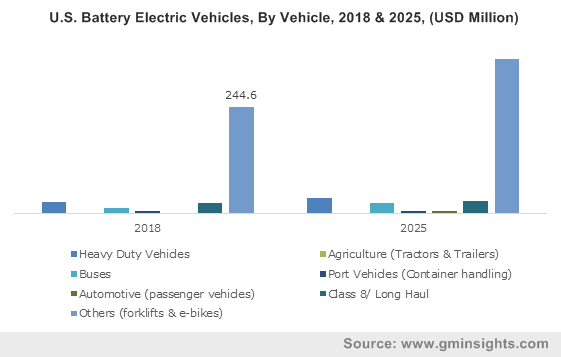Battery electric vehicles (BEV) market over 2019-2025 to be driven by growing adoption of electric buses, global industry valuation to surpass a mammoth USD 425 billion by 2025
Publisher : Fractovia | Published Date : 2019-04-30Request Sample
The constantly rising threat of global warming resulting from GHG emissions has considerably driven battery electric vehicles (BEV) market, along with tremendous investments from global auto giants and government agencies. The zero-emission nature of electric cars as well as the continuous improvements in battery storage and charging technologies have encouraged countries to implement policies that support BEV adoption, including tax incentives. Attempts by several governments to install free charging stations on roads and highways will further expand the reach of the BEV industry. As the global trade transforms gradually, exemption of duties on the import or export of EVs will also direct the manufacturing sector towards developing sustainable, emission-less vehicles.
Brazil Battery Electric Vehicles Market, By Vehicle, 2018 & 2025, (USD Million)

With millions of vehicles being produced all over the world each year, there undoubtedly exists the capacity to make BEVs on a large scale to replace all fossil fuel-powered cars within the next decade. However, development of affordable, reliable technology to offer cars having long-range and battery life still has a long way to go, which has entailed major partnerships underscoring the BEV industry around the globe. Examples of these include collaborations between Toyota and Suzuki, Ford and Mahindra, Ford and Volkswagen, BMW and Daimler, among other numerous big and small partnerships. Many of these joint ventures are also aimed at developing all-electric autonomous driving platforms, extending the scope of the BEV market significantly.
Notably, electric vehicles are not only crucial in lowering carbon emissions from passenger cars, but also from commercial operations. Trucks, public transport, fork lifts and other equipment at ports are few other areas of application where the BEVs are proving beneficial to reduce operational costs in addition to achieving sustainability targets. Tesla Inc. has apparently led the automotive BEV market for past few years, while many players like Volvo are establishing themselves in the areas of heavy duty or transport vehicles and electric buses.
Unveiling the scope of the BEV market with regard to the adoption of electric buses worldwide:
Diesel buses account for a large volume of carbon emissions globally and represent a key segment to help counter imminent climate issues. To understand the overall impact of greenhouse emissions, it is vital to consider the fact that air pollution is the cause of nearly 4 million deaths in Asia every year. Though electric cars will help to address this problem, electric buses will contribute even more to cut down on harmful emissions as compared to passenger cars. Estimates show that electric buses would be saving about 270,000 barrels of diesel per day in 2019, which is an overwhelming quantity.
Reportedly, most of the electric buses operating worldwide are in China and some of the country’s leading cities are close to achieving 100% electric-powered public transport, demonstrating the massive potential of the BEV industry. A key factor driving the adoption of electric buses is that countries are looking to source more and more power from renewable sources, where BEVs can provide a viable solution to stabilize the energy grid. Advanced battery storage technologies and fast charging capabilities would help to power these vehicles with excess energy generated and enable continuous operations.
Citing an instance which affirms the favorable stance of countries towards transport BEVs, the public transport operator of Paris recently ordered 800 new electric buses to replace their diesel counterparts and tackle the problem of smog in the French capital. Similar moves can certainly be expected in other developed as well as emerging economies globally, suggesting a vastly lucrative future for the commercial BEV market. Various innovations will further support the development and expansion of these vehicles, such as Continental’s latest tire, which is designed specifically for electric buses and optimized for use in city traffic.
All in all, the adoption of electric buses and other transport vehicles will immensely proliferate the global BEV market, which is anticipated to surpass $425 billion in valuation by 2025. Witnessing a number of technology joint ventures in recent years, the industry is comprised of key participants like Tesla, Volvo, Daimler AG, Groupe Renault, Volkswagen, General Motors, BMW and Toyota Motor Corporation.